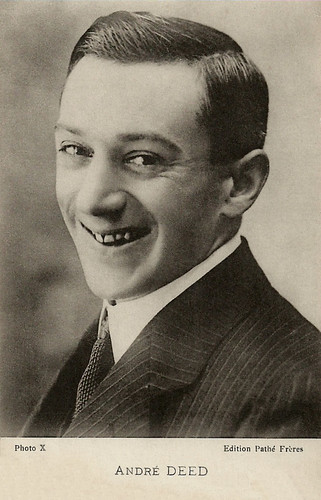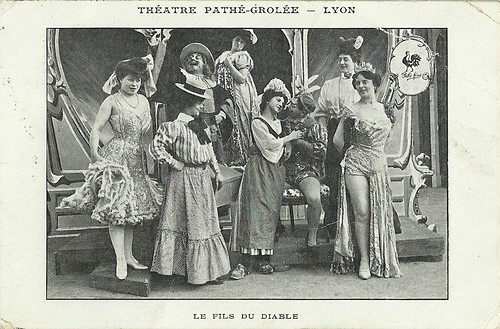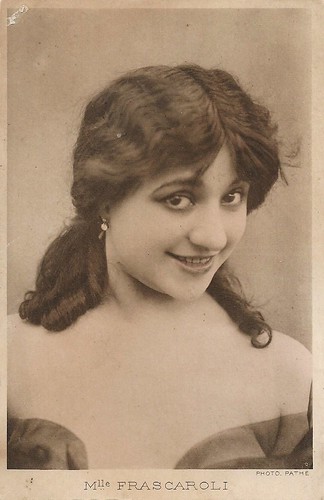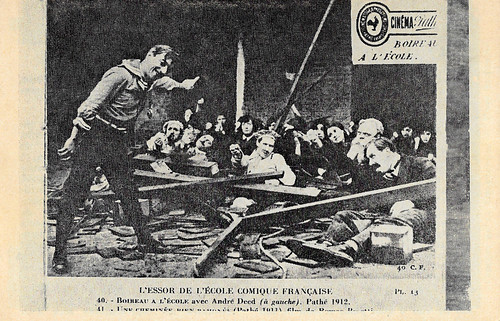André Deed (1879-1940) was one of the most popular comedians in French and Italian silent cinema. He was one of the first of the named actors in the cinema, and his film series based around Boireau and Cretinetti aka Foolshead were a global success. He also worked as a film director and scriptwriter.

French postcard by Edition Pathé Frères. Photo: X.

French postcard by Théâtre Pathé Grolée, Lyon. Photo: Pathé Frères. André Deed in Le fils du diable/The Devil's Son (Charles Lucien Lépine, 1906), with cinematography by Segundo De Chomon.

Spanish collectors card by Chocolates Piera i Brugueras in the Series Artistas Populares, no. 20 of 42. Photo: I.C. Plauber, Barcelona. French comedian André Deed was known in Spain as Toribio.
André Deed was born Henri André Augustin Chapais in Le Havre, France in 1879. He was the son of a customs official. The family moved to Nice when Henri André was young. He attended lycée in Nice while acting with a small theatre company. Around 1900, he started his career as a circus acrobat and then became a singer in vaudeville theatre and cabaret, including at the Folies Bergères.
In 1901 he took his first steps in the film world for film pioneer Georges Méliès. He played a Pierrot in the short comic fantasy Dislocation mystérieus/An Extraordinary Dislocation (Georges Méliès, 1901). Several body parts of a dancing clown float away from his body and come back again. In 1906 Deed started at Pathé Frères his own series of short comedies around Boireau, a comic character designed by himself. Among them are comedies like La course à la perruque/The Wig Chase (Georges Hatot, André Heuzé, 1906) with Léon Mathot, Boireau déménage/Foolshead Moved (Georges Hatot, 1906), and Les débuts d'un chauffeur/The Inexperienced Chauffeur (Georges Hatot, 1906).
Between 1906 and 1908, Deed made some 27 films for Pathé, directed by pioneer filmmakers like Georges Hatot and Georges Monca, though of several films the director is not known. Because of the huge popularity of the Boireau comedies, the Torinese company Itala Film lured Deed to Italy in 1908. There Deed started the series of Cretinetti (which can be translated as ‘little stupid’). He not only acted but also directed his own films. Just like in the French films, Deed behaved in quite anarchic way, creating destruction and pursuits all over.
Between 1909 and 1911 and between 1915 and 1920, Deed interpreted Cretinetti in some 90 shorts. A highlight is the absurdist Cretinetti e le donne/Cretinetti and the Women (André Deed, 1910), in which fanatic women tear the man to pieces. In the end, all his loose limbs gather again. At the time, Deed was after Max Linder the most popular film comedian of the European cinema. His Boireau and Cretinetti characters were even famous all over the world world, although under different names. He was known as Foolshead in English, Müller in German, Toribio in Spanish, Turíbio in Portuguese, Lehmann in Hungary, Glupyuskin in Russia, and so on.
The silent film stars Emilio Ghione and Alberto Collo started their careers in Deed’s films at Itala. He also met his future wife Valentina Frascaroli there. She would perform in many of his films.

Valentina Frascaroli. French postcard. Photo: Pathé.

French postcard, no. 3. Cliché X.

French postcard by Sadag de France, Imp., Paris, no. 40. Photo: Pathé Frères. André Deed in Boireau à l'école/Boireau at school (André Deed, 1912).
In 1912 André Deed went back to Pathé to perform as Boireau again. Cretinetti was named "Gribouille" in France, and so his first film for Pathé was entitled Comment Gribouille redevient Boireau/How Gribouille became Boireau again (André Deed, 1912). Valentina Frascaroli collaborated under the character name of Gribouillette.
From 1912 on Deed would make some 70 new shorts as Boireau. In 1913 Deed and Frascaroli did a big European and Latin American theatrical tour. When the First World War broke out in 1914, Deed was drafted first, but in 1915 Itala producer Giovanni Pastrone called him back to Italy. There he directed and played in the war propaganda film La paura degli aereomobili nemici/The fear for Zeppelins (André Deed, 1915) with Domenico Gambino, and Cretinetti e gli stivali del brasilero/Cretinetti and the Brazilian's boots (André Deed, 1916), which had Bartolomeo Pagano alias Maciste in a supporting part as a police officer, plus special effects by Segundo De Chomon.
Afterwards, Deed returned to France where he served in various sections of the army, though it is unknown whether he fought in the trenches. In 1918 he married Frascaroli and in 1919 he was demobilised. In 1920-1921 Deed started a trilogy of Italian fantasy-adventure-films: Il documento umano/The human document (André Deed, 1920), L’uomo meccanico/The Mechanical Man (André Deed, 1921) and Lo strano amore di Mado/The Strange Love of Mado.
L’uomo meccanico was regarded as lost, but some reels of the Portuguese release version were discovered in Brazil. The discovered film amounted to 740 meters which is believed to be approximately 40% of the complete film. This was restored by the Cineteca Comunale di Bologna. L’uomo meccanico/The Mechanical Man is about an indestructible robot which in the end only creates havoc. At the end of the film, there is a spectacular scene with a battle between two robots in the Opera House.
The latter film of the trilogy, Lo strano amore di Mado/The Strange Love of Mado, was never realised. The popularity of Deed had diminished and new comedians like Charlie Chaplin had taken his place. Deed returned to France, where he still acted in films. In the early sound era, he only could find minor parts. By the late 1930s, Deed was forgotten by the industry that he helped to launch. He worked as a night watch at the Pathé studios, located in the Parisian suburb of Joinville-le-Pont. Broke and forgotten, André Deed died in 1940 in Paris. He was 61. His wife Valentina Frascaroli passed away in 1955.
André Deed as Cretinetti in Le delizie della caccia/The Delights of Hunting (André Deed, 1910). Source: YasHY2804 (YouTube).
Scene from L’uomo meccanico/The Mechanical Man (André Deed, 1921). Source: JH Banner (YouTube).
Sources: Ivo Blom (All the Same or Strategies of Difference: Early Italian Comedy in International Perspective), Wikipedia (Italian, French and English), and IMDb.
This post was last updated on 10 December 2023.

French postcard by Edition Pathé Frères. Photo: X.

French postcard by Théâtre Pathé Grolée, Lyon. Photo: Pathé Frères. André Deed in Le fils du diable/The Devil's Son (Charles Lucien Lépine, 1906), with cinematography by Segundo De Chomon.

Spanish collectors card by Chocolates Piera i Brugueras in the Series Artistas Populares, no. 20 of 42. Photo: I.C. Plauber, Barcelona. French comedian André Deed was known in Spain as Toribio.
Foolshead
André Deed was born Henri André Augustin Chapais in Le Havre, France in 1879. He was the son of a customs official. The family moved to Nice when Henri André was young. He attended lycée in Nice while acting with a small theatre company. Around 1900, he started his career as a circus acrobat and then became a singer in vaudeville theatre and cabaret, including at the Folies Bergères.
In 1901 he took his first steps in the film world for film pioneer Georges Méliès. He played a Pierrot in the short comic fantasy Dislocation mystérieus/An Extraordinary Dislocation (Georges Méliès, 1901). Several body parts of a dancing clown float away from his body and come back again. In 1906 Deed started at Pathé Frères his own series of short comedies around Boireau, a comic character designed by himself. Among them are comedies like La course à la perruque/The Wig Chase (Georges Hatot, André Heuzé, 1906) with Léon Mathot, Boireau déménage/Foolshead Moved (Georges Hatot, 1906), and Les débuts d'un chauffeur/The Inexperienced Chauffeur (Georges Hatot, 1906).
Between 1906 and 1908, Deed made some 27 films for Pathé, directed by pioneer filmmakers like Georges Hatot and Georges Monca, though of several films the director is not known. Because of the huge popularity of the Boireau comedies, the Torinese company Itala Film lured Deed to Italy in 1908. There Deed started the series of Cretinetti (which can be translated as ‘little stupid’). He not only acted but also directed his own films. Just like in the French films, Deed behaved in quite anarchic way, creating destruction and pursuits all over.
Between 1909 and 1911 and between 1915 and 1920, Deed interpreted Cretinetti in some 90 shorts. A highlight is the absurdist Cretinetti e le donne/Cretinetti and the Women (André Deed, 1910), in which fanatic women tear the man to pieces. In the end, all his loose limbs gather again. At the time, Deed was after Max Linder the most popular film comedian of the European cinema. His Boireau and Cretinetti characters were even famous all over the world world, although under different names. He was known as Foolshead in English, Müller in German, Toribio in Spanish, Turíbio in Portuguese, Lehmann in Hungary, Glupyuskin in Russia, and so on.
The silent film stars Emilio Ghione and Alberto Collo started their careers in Deed’s films at Itala. He also met his future wife Valentina Frascaroli there. She would perform in many of his films.

Valentina Frascaroli. French postcard. Photo: Pathé.

French postcard, no. 3. Cliché X.

French postcard by Sadag de France, Imp., Paris, no. 40. Photo: Pathé Frères. André Deed in Boireau à l'école/Boireau at school (André Deed, 1912).
Nightwatch in the Pathé Studios
In 1912 André Deed went back to Pathé to perform as Boireau again. Cretinetti was named "Gribouille" in France, and so his first film for Pathé was entitled Comment Gribouille redevient Boireau/How Gribouille became Boireau again (André Deed, 1912). Valentina Frascaroli collaborated under the character name of Gribouillette.
From 1912 on Deed would make some 70 new shorts as Boireau. In 1913 Deed and Frascaroli did a big European and Latin American theatrical tour. When the First World War broke out in 1914, Deed was drafted first, but in 1915 Itala producer Giovanni Pastrone called him back to Italy. There he directed and played in the war propaganda film La paura degli aereomobili nemici/The fear for Zeppelins (André Deed, 1915) with Domenico Gambino, and Cretinetti e gli stivali del brasilero/Cretinetti and the Brazilian's boots (André Deed, 1916), which had Bartolomeo Pagano alias Maciste in a supporting part as a police officer, plus special effects by Segundo De Chomon.
Afterwards, Deed returned to France where he served in various sections of the army, though it is unknown whether he fought in the trenches. In 1918 he married Frascaroli and in 1919 he was demobilised. In 1920-1921 Deed started a trilogy of Italian fantasy-adventure-films: Il documento umano/The human document (André Deed, 1920), L’uomo meccanico/The Mechanical Man (André Deed, 1921) and Lo strano amore di Mado/The Strange Love of Mado.
L’uomo meccanico was regarded as lost, but some reels of the Portuguese release version were discovered in Brazil. The discovered film amounted to 740 meters which is believed to be approximately 40% of the complete film. This was restored by the Cineteca Comunale di Bologna. L’uomo meccanico/The Mechanical Man is about an indestructible robot which in the end only creates havoc. At the end of the film, there is a spectacular scene with a battle between two robots in the Opera House.
The latter film of the trilogy, Lo strano amore di Mado/The Strange Love of Mado, was never realised. The popularity of Deed had diminished and new comedians like Charlie Chaplin had taken his place. Deed returned to France, where he still acted in films. In the early sound era, he only could find minor parts. By the late 1930s, Deed was forgotten by the industry that he helped to launch. He worked as a night watch at the Pathé studios, located in the Parisian suburb of Joinville-le-Pont. Broke and forgotten, André Deed died in 1940 in Paris. He was 61. His wife Valentina Frascaroli passed away in 1955.
André Deed as Cretinetti in Le delizie della caccia/The Delights of Hunting (André Deed, 1910). Source: YasHY2804 (YouTube).
Scene from L’uomo meccanico/The Mechanical Man (André Deed, 1921). Source: JH Banner (YouTube).
Sources: Ivo Blom (All the Same or Strategies of Difference: Early Italian Comedy in International Perspective), Wikipedia (Italian, French and English), and IMDb.
This post was last updated on 10 December 2023.
No comments:
Post a Comment